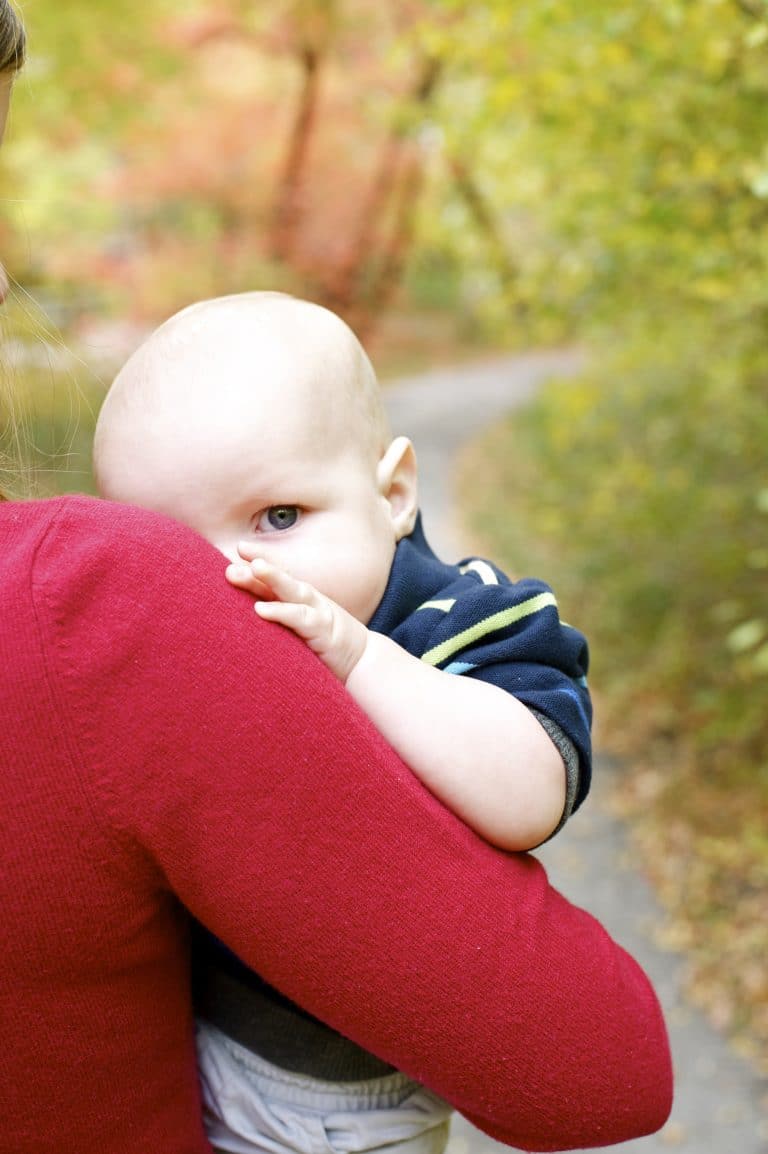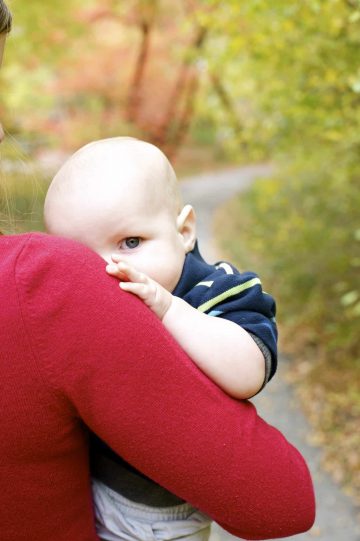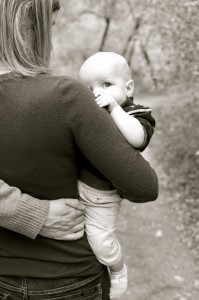In essence, that’s all you have to do. That’s all you need to say.
Sometimes we encounter a friend, ward member, or family member who is in so much pain, we feel like the right words are completely lost. Most of the time it’s because we have no experience in what they’re going through. How then can we be of comfort to them? We want them to feel better, but it seems we’re destined to say the wrong thing. Yet we feel obligated to respond. So what can be done?
My baby has been sick with a rare form of infant seizures categorized as a “catastrophic epilepsy” due to its urgency and impact on physical and cognitive development.* We don’t know the cause, but we do know that compared to other babies with his seizure type, he’s been very lucky. Despite a delayed diagnosis (and wading through multiple misdiagnoses), the frequent potentially brain-damaging seizures abated quickly, and we have resources to work toward a normal development. But despite this good news, I’ve been a total wreck. First, there was the struggle to even get an EEG and convince the doctors that it wasn’t mere acid reflux. Then there was the period of researching the rare disorder, and facing the terrifying statistics for outcomes. After that, I found an online community of moms who have infants with the same disorder, and found out that each baby’s case is unique. And now things have slowed a bit, as the most major devastating causes have been ruled out, and we let the treatment take effect.
All throughout this time, I’ve reached out to family and friends in desperation, to share my concerns, to tell someone that in the middle of the night that here I was, a sobbing mother who felt my only child was slipping away, and I was powerless to stop it. I’ve also shared my euphoria at good news and optimistic neurology reports. I am glad I have not been silently bearing this—I have opened up and told my community that I need support if I’m going to get through this. And since my baby needs me, I have a vested interest in taking care of myself emotionally.
I have been so impressed with the response I’ve received when I’ve reached out, but I admit I’m not sure if I deserve it. In the past, I’ve been frightened by the immense pain of others. There was that sister in my old singles’ ward who bore her testimony in Relief Society about her sexual abuse, and I remember feeling embarrassed for her and frightened of her public sharing of this intimate detail. There was the woman I served in the Young Women’s presidency with who was going through a divorce, and I felt like I had nothing to say to comfort her and so I didn’t reach out sufficiently in a way I now wish I had. And there was the sister I visit taught years ago who sent me a Christmas card after she moved out of the ward, telling me her new baby was having developmental problems. I left her card on my table for months, intending to call, but being petrified to actually make the phone call because I didn’t know what to say or how to respond to this brokenhearted mother. Yes, I’ve failed to comfort others even when I had proximity and reasonable stewardship, mostly out of my own fears and feelings of inadequacy.
So I’ve needed to learn what I’ve learned through this outpouring of support. And what I’ve learned is that is doesn’t take much to make a difference. It doesn’t take a prognosis or prediction of how the problem will resolve. It doesn’t even take personal experience in the same type of suffering. All it takes is to say: I acknowledge your pain. I understand your worry. I understand you need to deal with what is in front of you right now. I’ll sit with you. I’ll pray for you. I’ll light a candle for you, and do my sun salutations for you. I’ll hope the best for you and those you care for. “Tell me about despair, yours, and I will tell you mine.”
I’m grateful to my friends and family for teaching me this kind of gentle, healing compassion.
_________________________
*Incidentally, November is epilepsy awareness month. If you’re so inclined, take time to become seizure smart and appreciate those with epilepsy in your life.







19 Responses
Great post.
Beautiful Alisa. It’s such a hard lesson to learn. I’ve been holding your family in my heart.
This is so lovely…after going through a trial, I often think, “Why have I done it so badly when I was the observer?” I guess that’s the handy thing about trials, I’ve learned how to be a bit more empathetic and less worried about offending and more worried about not being supportive.
Blessings on you and your family as you continue on this journey, my friend.
Alisa,
Thanks for this. We had a rough morning again with Jaxon’s treatments and it helps me remember that we don’t have to do this alone. We can reach out and find support from others.
Love, hugs, and kisses, -Jess
Thank you for a beautiful post. I think that by mourning with those who mourn, we are comforting those in need of comfort. We aren’t able to make it better, or say the right words most of the time. But we can allow ourselves to feel, and to share the cross.
Beautiful Alisa.
We can never know another’s pain. And often trying to say “the right thing” is a pointless exercise. But being there isn’t pointless. It’s what I tried to express about the woman who brought me the cookie in the hospital when I was so ill. I’ve never forgotten the beauty of her outstretched hand and that napkin-wrapped cookie. Such love.
Thank you for the quote, “Tell me about despair, yours, and I will tell you mine” which gives me permission to own my own grief without minimizing it for the benefit of others when I compare mine and theirs. The Hawaiians would call this “talk story.”
From your post, I’ve gained an insight into the line of the Desiderata that I struggle with most “If you compare yourself with others,
you may become vain or bitter, for always there will be greater and lesser persons than yourself.”
I’ve always found it very difficult to allow people into my experiences and trials. I’m not sure if it is a fear of looking like an attention getter, or fear of not being supported, but I’ve been slowly learning to appreciate the need to put ourselves out there and allow others the opportunity to be there for us. There is real beauty in exposing ourselves this way and increasing and strengthening our connections by admitting our struggles and weaknesses.
Thanks for allowing me to be part of your support Alisa. Hang in there.
Oh, Alisa — did you know that Wild Geese is *my* poem, the one whose lines have come to me at so many pivotal moments of my life — starting with the opening line:
“You do not have to be good.”
(You just have to be.) Love to you and your beautiful son.
I too feel the awkwardness of not knowing what to say to someone in pain. I often wonder why I am so hard on myself though, when I can’t remember ever being upset with anyone who was genuine in their effort to comfort me. So I just try to be honest and speak up if I can. It’s still hard though. I second guess myself a lot when I comfort people and it can be emotionally draining for me to talk with someone going through a tough time, because I always replay the interaction later.
Thanks for sharing this articulate and moving post. All the best to you and your family through all of this.
Beautiful post, Alisa. This is something I needed to hear. Blessings on you and baby.
And another thanks for the link to the Mary Oliver poem. A perfect, perfect poem. People should also check out The Journey, which just makes my breath catch every time I read it. http://www.poetryconnection.net/poets/Mary_Oliver/3124
alisa, thank you for sharing this so openly and honestly. I’m probably a lot like you, in that I feel so powerless in the face of other people’s grief, and I never know how to respond to it. Thank you for addressing that in such a powerful way here.
blessings to you and your family.
I almost didn’t leave a comment.
Feeling that same way. I’m thinking of you and your family! And, I have lots of time to do it having mono. 🙂
Mono really stinks. 🙁 I hope you get through it OK!
Much love to you and your family, Alisa. I’m glad you’ve found an online community of families. That’s one of the beauties of the internet, no matter how rare the condition, you can connect with someone who’s going through it. I spent a lot of time frantically searching for information and talking to other parents in that first year of my daughter’s diagnosis and that was a tremendous support. Wishing you comfort, peace, and the arms of friends and family around you.
Oh, and I just wanted to add, that picture of him peeking over your shoulder is adorable. I just want to smooch that little fuzzy head.
Thanks for this post, Alisa! I hope good things are in store for your son and you.
I second everyone else who’s agreed that it’s difficult to know what to say to support someone who is suffering; thanks for pointing out that maybe it doesn’t have to be the perfect thing. Hopefully this will help me be more supportive to people around me.
I’m so glad you wrote this.
Thank you thank you thank you for this post.